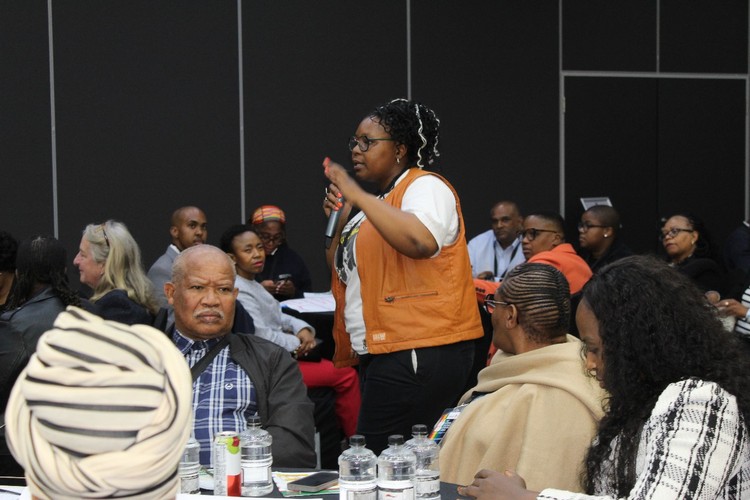
25 August 2025
The author participating in a discussion as the National Convention. Photo supplied by UNISA
I recall my banter with comrade S’bu Zikode from Abahlali BaseMjondolo. I said, “S’bu, when was the last time I was in a room with so many government political principals and officials?”
S’bu replied, “That’s when you must know that things are very bad, comrade. When the government sits so close to civil society, the country is in deep trouble.”
I settled into my red seat in the ZK Matthews Hall at UNISA and prepared for a morning of careless rhetoric from those in power and patronising calls for collective action. It was 15 August, and the South African National Dialogue’s first “National Convention” had begun.
For some of us, participating in the convention was not an act of endorsement but rather a way of insisting that this country’s future cannot be determined without the voices of its most vulnerable population — children and young people.
Statistics released this month confirmed that 140,000 more South Africans became unemployed between April and June, taking our unemployment rate to a scary 33.2%. The new generation is in a public education system where 81% of learners in Grade 4 cannot read for meaning, and nearly 41% prematurely exit the education system before reaching Grade 12.
We have become dangerously desensitised to these statistics; they have become cheap politicking points in national debates. But these are not just numbers. They are lives stalled, spirits dimmed, families broken, and communities robbed of possibility. We are in deep trouble.
What we witnessed in the build-up to this convention was a reflection of our political landscape.
Legacy foundations made false claims about civil society as their constituency — the Thabo Mbeki Foundation rejected an invitation to the national convention, claiming to have engaged “a very large swathe of civil society” organisations over the past 11 months.
Opposition parties provided neat soundbites about government failure, while statistics show that their MPs frequently miss parliamentary meetings, and they, too, loot provincial budgets for party benefit.
Government officials, for their part, displayed a disheartening indifference during the convention. Few joined and participated in the dialogues, the spaces created for active listening. They even ate in their own enclave in one exclusive part of the building – tone-deaf to the fire in the voices of people in the plenary.
There was also the silly notion that South Africans have already all spoken, through their vote in last year’s election … Hay’ iya shorta, maqabane!
Sithembile Mbethe’s reflections on the 2024 election point out that South Africa’s eligible voting-age population turnout was 41% in 2024 - 15% below the global average.
Voter turnout is a crucial barometer for the vitality and health of a democracy. A low voter turnout gauges the legitimacy of elected governments. South Africans do not speak only when they vote. Young people under 30 made up 54% of those eligible to vote, and yet in this last electoral cycle, this age group made up less than a fifth of all registered voters.
Young people know that the current party-political system reproduces a political elite more interested in their own survival than in transformation. We are tired of this posturing. We joined others at the first national convention to use this moment to start the long journey towards building true people’s power.
If this National Dialogue is to mean anything, the government must shake off the tenders, roll up their sleeves, excuse themselves from the party T-shirt and join civil society and ordinary people living in South Africa. The government and the nation’s elites must come here ready to listen.
All of us, including Cyril Ramaphosa, already know our problems. What was clear from the discussions in plenary and in the dialogue labs is that this moment is not just to restate our issues but rather to collectively build something.
Thirty years after democracy, we have an opportunity to build a nation that truly leaves no one behind. We desperately need to come together across our different struggles: from education, health, land, energy, to gender justice and the rights of those differently-abled.
If the National Dialogue is to be more than another elite process, I call for the removal of elite structures like the Eminent Persons Group (EPG). I know some comrades in the current EPG structure who would have joined this call for action. Citizens do not need gatekeepers or people sitting in the golden circle of plenary venues. We need direct participation, accountability, and a reckoning with the state’s failures.
Let’s build a different kind of culture and let it be rooted in a love ethic that disrupts the hollow nationalism of slogans and cult politics of the “big man” or “eminence”.
I was surprised to see how some elders in the room at the convention were offended by the fire and urgency with which young people spoke. This shows how much still needs to be done. Young people are fired up because of their daily experience: while young South Africans may not have faced apartheid, they are living through an oppression that is no less material.
They are harassed when they protest, they go days without water or electricity, they are excluded from economic life, and too many are lost to violence long before they reach adulthood.
And to the elders: if you are committed to building a better nation, you need to sit with that discomfort rather than dismiss it, and support us, doing the unfinished work of the transition. Siyeza — we are coming!
Now, with all that said, let me go and find others like me. We will not wait for permission to build the power we need. This will be hard, long-term work, but we deserve an opportunity to start now.
Views expressed are not necessarily those of GroundUp.